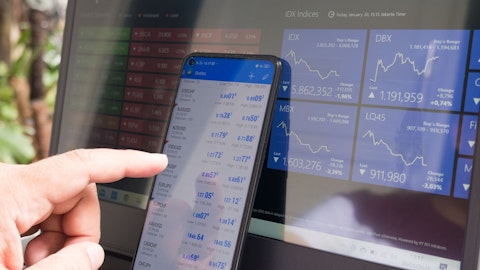Douglas French : And the efficiencies will be holistically lucrative.
Vince Valentini: Okay. Thank you.
Robert Mitchell: Thanks, Vince. Next question, please.
Operator: Our next question comes from Tim Casey of BMO. Please go ahead.
Tim Casey: Thanks. Two questions. One, I’m wondering if the challenges you’ve had at TELUS International, how that is influencing how you’re approaching TELUS Health? And it’s half to some sort of corporate event? And second, we are getting questions on how you’re thinking about your dividend growth plan and your three-year commitments to 7%. Wondering if you could frame that in light of, I guess, the headwinds in TELUS International, but your announcement today of restructuring and restructuring savings going forward?
Darren Entwistle: Okay. Let me kick it off with TI and TELUS how to very explicitly answer your question, Tim. I think TI despite what’s transpired in Q2 remains an exemplary model for TELUS Health, the TI organization has had an excellent track record of success historically and had surpassed the expectations on many instances in the past, leading up to add and post the IPO process. I think TI’s track record of success on differentiation, product development, client affinity has been absolutely key for that organization. And the duration of the success, I think, is quite telling in that regard. So the hiccup that’s transpired in Q2 did not diminish TI, I think, is the right model as it relates to TELUS Health. And one of the other key attributes of TI success is the duality of their performance in terms of both organic growth and smart inorganic moves that were well integrated and significant value was created from those acquisitions.
And I think that is, again, is a good model for the TELUS Health organization to follow. Our expectations of TELUS Health remain undiminished. And if anything, I would say they’re emboldened and accelerating. The other thing that is clear and maybe we need to make it more clear is TI is not just a terrific enabler of TELUS on everything from customer service to digital progression, but TI is a significant enabler of TELUS Health itself as TELUS Health goes through its improvements on cost efficiency, customer service excellence, product development and digital and gen AI progression. They will be aided and embedded by TI every single step of the way. And of course, TI, which focuses on the health vertical as well, we’ll take those capabilities and not only serve TELUS Health well, but productize them within the overall external market.
And so I think that’s quite a compelling composition and we’re very much looking forward to realizing the synergies that we’ve articulated for TELUS Health at the $425 million level, where we’ve highlighted $325 million of part synergies in terms of key efficiencies that TI will be supporting along the way to make sure that we deliver against that $325 million number. And I look forward to significantly improving upon the $100 million of revenue synergies from the plentiful cross-selling opportunities that we have.
Douglas French: And on the dividend growth side, if anything, the initiatives we talked about today will solidify our passion to continue that going and our commitment to keeping that going. When you — our decisions are off of free cash flow. And to Darren’s point, in our discussion of free cash flow will accelerate as we move into the future, we don’t see our commitment to that changing at all.
Tim Casey: Thank you.
Darren Entwistle: Quite the reverse.
Darren Entwistle: Thanks, Tim. Operator, next question please.
Operator: Thank you. Our next question comes from Stephanie Price of CIBC. Please go ahead.
Stephanie Price: Good morning. I think your thoughts around capital allocation between the base business and TI and the growth businesses. As you noted, free cash flow is expected to accelerate from here. I’m just curious how you’re thinking about where that marginal dollar should go? And then I’ve got another question.
Darren Entwistle: So if you look at the preponderance of our capital composition, how we’ve executed discretionary decisions on capital allocation, Firstly, TI has to stand on its own two feet, leveraging its own balance sheet and its own transaction currency, which is why we’re interested in valuation improvement for that organization. For TELUS, I think it’s been fairly transparent, the big consumers of capital, which I think have paid off handsomely, and you can see it in the best-in-class operating results that we have generated, number one, we have invested and we’ll continue to invest in wireless network technologies from 4G+ to 5G to 5G+ and of course, the spectrum that fuels our capacity along the way. Second, you’ll see us continue to invest in pure fiber broadband with its attendant attributes of product intensity realization significantly above 3%, a cost to serve in terms of the external network that’s 70% better than copper, a revenue per home that’s 20% better than copper, a margin per home that’s 25% better than copper and a churn rate that’s 20% better than copper, you’ll continue to see us make those investments.
Number three has been our focus on digital progression, digital transformation, AI and generative AI moving that continuum along the way. We wouldn’t be able to do what we’re doing today in terms of staff level efficiencies without what we’ve done over the last 36 months in that regard. And that’s a really critical factor for us because to be able to make those moves and because of our digital competency and capability set, do not miss a beat in our go-to-market operations or our customer service excellence I think, is a really distinguishing story. Fourth area for us is success-based capital, and this is demonstrably within the core business of this organization, and you can see it reflected within our operational loading features. And then the last area is supporting the growth of our data-centric businesses, data-centric businesses on health.




